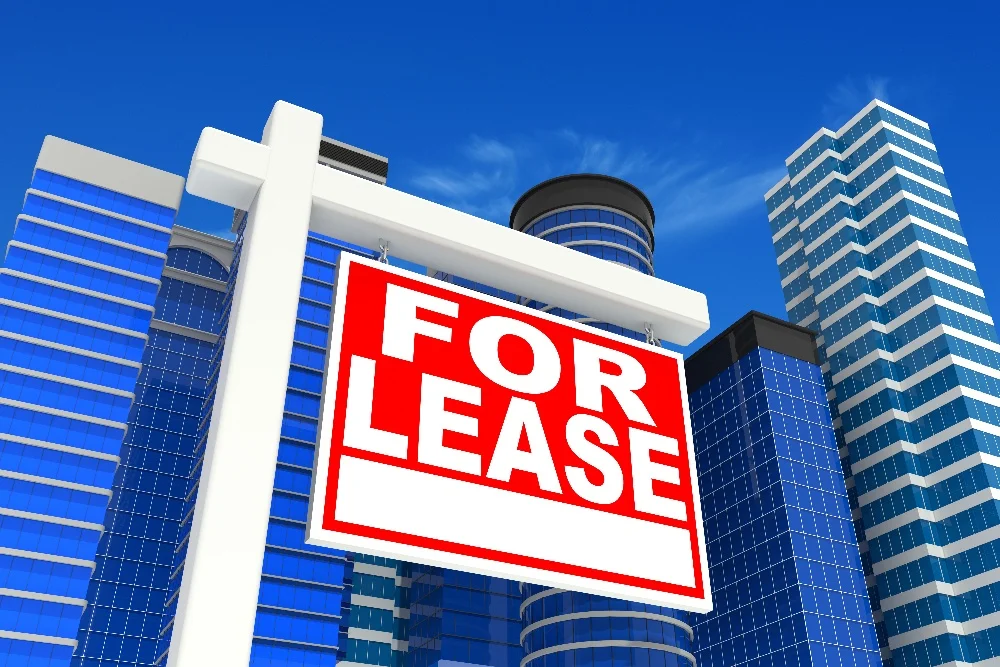As a real estate course on leasing commercial real estate, this comprehensive guide will provide you with the essential knowledge and skills needed to succeed in the dynamic Fort Lauderdale, FL market.
Whether you’re a seasoned professional or just starting your career in commercial real estate, understanding the intricacies of leasing is crucial for achieving your goals.

Commercial buildings with a ‘FOR LEASE’ sign indicating available leasing opportunities.
Understanding Local Zoning Laws for Commercial Leases in Fort Lauderdale
Navigating the complex world of zoning laws is a critical aspect of leasing commercial real estate in Fort Lauderdale.
Zoning regulations dictate how properties can be used and developed, making it essential for landlords and tenants to understand their implications.
Overview of Fort Lauderdale zoning laws:
- Fort Lauderdale has a comprehensive zoning code that governs land use and development throughout the city.
- The zoning code is divided into various districts, each with its own set of permitted uses, building heights, setbacks, and other regulations.
Importance of zoning in commercial leasing:
- Zoning laws directly impact the types of businesses that can operate within a specific property.
- Failure to comply with zoning regulations can result in fines, legal issues, and potential lease termination.
Steps to research and comply with local zoning regulations:
- Identify the zoning district in which the property is located.
- Review the permitted uses and restrictions for that district.
- Ensure the intended use of the property aligns with the zoning regulations.
- Obtain necessary permits and approvals before signing a lease or commencing operations.
Examples of common zoning issues and how to address them:
- Change of use: If a tenant wishes to use a property for a purpose not permitted by the current zoning, they may need to apply for a variance or rezoning.
- Parking requirements: Zoning laws often dictate the number of parking spaces required for a given property use. Landlords and tenants must ensure sufficient parking is available.
Understanding Zoning Laws in Fort Lauderdale
| Key Points | Definitions/Categories |
|---|---|
| Zoning Districts | Specific areas with unique land use and development regulations |
| Permitted Uses | Activities and businesses allowed within a zoning district |
| Setbacks | Required distances between buildings and property lines |
| Variances | Exceptions to zoning rules granted by the city |
| Rezoning | Changing the zoning classification of a property |
How to Navigate Commercial Lease Negotiations in Fort Lauderdale
Successfully negotiating a commercial lease is vital for both landlords and tenants.
By understanding the key considerations and employing effective strategies, you can secure favorable terms and minimize potential conflicts.
Preparing for lease negotiations: key considerations
- Determine your priorities and non-negotiables before entering discussions.
- Research market rates and comparable properties to establish a fair lease rate.
- Understand the landlord’s motivations and constraints.
Strategies for successful lease negotiation:
- Be willing to compromise on minor points to secure more important concessions.
- Offer a longer lease term in exchange for more favorable rates or tenant improvements.
- Negotiate renewal options and rent escalation clauses to provide long-term stability.
Common pitfalls and how to avoid them:
- Failing to thoroughly review the lease document: Carefully read and understand all lease terms before signing.
- Not seeking professional advice: Consult with a commercial real estate attorney and broker to protect your interests.
Real-life examples of successful lease negotiations in Fort Lauderdale:
- A tech startup secured a below-market lease rate by agreeing to a longer lease term and providing a larger security deposit.
- A restaurant owner negotiated tenant improvement allowances to offset the cost of building out their space.
Key Terms and Clauses in Fort Lauderdale Commercial Leases
Understanding the essential terms and clauses in a commercial lease is crucial for both landlords and tenants.
By familiarizing yourself with these key components, you can better protect your interests and avoid potential disputes.
Explanation of essential lease terms and clauses:
- Base Rent: The fixed monthly amount paid by the tenant for the use of the space.
- Operating Expenses: Costs associated with maintaining and operating the property, often shared between the landlord and tenant.
- Tenant Improvements: Modifications or upgrades made to the space to suit the tenant’s needs, which may be funded by the landlord, tenant, or both.
- Sublease and Assignment: Provisions governing the tenant’s ability to transfer their lease rights to another party.
Importance of each term and clause in a lease agreement:
- Each lease term and clause plays a critical role in defining the rights and responsibilities of both parties.
- Carefully negotiating these terms can help minimize financial risks and ensure a smoother landlord-tenant relationship.
Tips for reviewing and understanding lease documents:
- Take the time to thoroughly read and comprehend each section of the lease.
- Ask questions and seek clarification on any unclear or ambiguous terms.
- Have a commercial real estate attorney review the lease and provide guidance.
Commonly misunderstood clauses and their implications:
- Rent Abatement: A period during which the tenant is not required to pay rent, often used as an incentive or to account for construction delays.
- Exclusive Use: A clause that prohibits the landlord from leasing space to the tenant’s direct competitors within the same property.
Key Terms and Clauses in Commercial Leases
| Term/Clause | Definition | Importance |
|---|---|---|
| Base Rent | Fixed monthly rent amount | Establishes the primary financial obligation of the tenant |
| Operating Expenses | Costs of maintaining and operating the property | Determines how these costs are shared between landlord and tenant |
| Tenant Improvements | Modifications or upgrades to the space | Affects the suitability of the space for the tenant’s needs and can impact move-in timelines |
| Sublease and Assignment | Provisions for transferring lease rights | Governs the tenant’s flexibility in the event of business changes or relocation |
| Rent Abatement | Period of no rent payment | Can serve as an incentive or account for construction delays |
| Exclusive Use | Prohibits leasing to tenant’s direct competitors | Protects the tenant’s business interests within the property |
Common Challenges in Leasing Commercial Real Estate in Fort Lauderdale
Leasing commercial real estate in Fort Lauderdale can present various challenges for both landlords and tenants.
By understanding and preparing for these common issues, you can minimize their impact and ensure a more successful leasing experience.
Typical challenges faced by lessees in Fort Lauderdale:
- Limited availability of suitable properties in desirable locations.
- Competitive market conditions lead to higher lease rates and fewer concessions.
- Navigating complex zoning and permitting requirements.
- Securing financing for tenant improvements and lease deposits.
Strategies to overcome these challenges:
- Start the property search early and be prepared to act quickly when a suitable space becomes available.
- Work with a knowledgeable commercial real estate broker who can help identify off-market opportunities and negotiate favorable terms.
- Thoroughly research zoning and permitting requirements and factor them into your leasing timeline.
- Explore alternative financing options, such as SBA loans or partnering with investors, to fund tenant improvements and deposits.
Case studies of common issues and their resolutions:
- A retail tenant faced zoning restrictions that limited their signage options. By working with the landlord and local officials, they were able to secure a variance that allowed for greater visibility.
- A medical office tenant encountered unexpected construction delays, causing them to miss their target move-in date. By negotiating a rent abatement period and flexible lease commencement date, they were able to mitigate the financial impact of the delay.
Resources and support for lessees:
- Commercial real estate brokers and attorneys who specialize in the Fort Lauderdale market.
- Local business organizations and chambers of commerce provide networking opportunities and educational resources.
Best Practices for Leasing Commercial Real Estate in Fort Lauderdale
By implementing best practices throughout the leasing process, landlords, and tenants can minimize risks, streamline negotiations, and achieve their desired outcomes.
Comprehensive checklist for leasing commercial real estate:
- Determine your space requirements and budget.
- Research market conditions and available properties.
- Tour potential spaces and evaluate their suitability.
- Negotiate lease terms and review the lease document.
- Obtain necessary permits and approvals.
- Coordinate tenant improvements and prepare for move-in.
- Conduct a final walk-through and sign the lease.
Tips for ensuring a smooth leasing process:
- Maintain open and transparent communication with all parties involved.
- Set realistic timelines and build in contingencies for potential delays.
- Document all agreements and changes in writing.
Importance of professional assistance (brokers, attorneys):
- Commercial real estate brokers can provide valuable market insights, assist with property searches, and negotiate lease terms on your behalf.
- Attorneys specializing in commercial real estate can review lease documents, protect your legal interests, and help resolve disputes.
Long-term considerations for lease agreements:
- Consider the potential for business growth and ensure the lease allows for flexibility to expand or sublease if needed.
- Assess the landlord’s reputation for property maintenance and responsiveness to tenant concerns.
- Evaluate the property’s location and its potential impact on employee recruitment and retention.
Best Practices for Leasing Commercial Real Estate
| Tip | Action Item | Benefit |
|---|---|---|
| Start early | Begin the property search and lease negotiation process well in advance of your desired move-in date | Allows for more time to find the ideal space and negotiate favorable terms |
| Collaborate with professionals | Engage a commercial real estate broker and attorney early in the process | Provides expert guidance, market insights, and legal protection |
| Prioritize communication | Maintain open and transparent communication with all parties involved | Helps prevent misunderstandings and facilitates smoother negotiations |
| Plan for the future | Consider your long-term business needs when evaluating properties and negotiating lease terms | Ensures the space can accommodate future growth and change |

A commercial real estate broker shaking hands with a tenant, symbolizing a successful lease negotiation
Why Mastering Commercial Real Estate Leasing in Fort Lauderdale is Important
Understanding and mastering the intricacies of commercial real estate leasing in Fort Lauderdale is essential for the success of both landlords and tenants.
By developing a deep knowledge of local market conditions, zoning laws, and leasing best practices, you can make informed decisions that support your business objectives.
Summary of key points discussed in the article:
- Navigating zoning laws and their impact on commercial leasing.
- Strategies for successful lease negotiations and key terms to understand.
- Common challenges faced by lessees and how to overcome them.
- Best practices for ensuring a smooth and successful leasing process.
The impact of understanding and navigating commercial leases:
A thorough understanding of commercial leases empowers landlords and tenants to make sound business decisions, minimize risks, and create mutually beneficial agreements.
The value of proper preparation and knowledge:
By investing time in learning about the Fort Lauderdale commercial real estate market and leasing process, you can enter negotiations with confidence and secure more favorable outcomes for your business.
Encouraging readers to apply the insights and resources provided:
Equipped with the knowledge and resources outlined in this guide, readers are well-positioned to tackle the challenges and opportunities of leasing commercial real estate in Fort Lauderdale.
By applying these insights and seeking the support of experienced professionals, landlords, and tenants can navigate the leasing process with greater ease and success.
FAQs
What are the zoning
What are the zoning laws for commercial properties in Fort Lauderdale?
Fort Lauderdale has a comprehensive zoning code that governs land use and development. The code is divided into various districts, each with its own set of permitted uses, building heights, setbacks, and other regulations. It’s crucial to identify the zoning district of a property and ensure compliance with its specific requirements.
How do I negotiate a favorable commercial lease in Fort Lauderdale?
To negotiate a favorable commercial lease, determine your priorities, research market rates, and understand the landlord’s motivations. Be willing to compromise on minor points to secure more important concessions, and consider offering a longer lease term in exchange for better rates or tenant improvements. Seek professional advice from a commercial real estate broker and attorney.
What are the essential terms and clauses in a commercial lease agreement?
Essential terms and clauses in a commercial lease include base rent, operating expenses, tenant improvements, sublease and assignment provisions, rent abatement, and exclusive use clauses. Each term plays a critical role in defining the rights and responsibilities of both parties and should be carefully reviewed and negotiated.
What challenges should I expect when leasing commercial real estate in Fort Lauderdale?
Common challenges in leasing commercial real estate in Fort Lauderdale include limited availability of suitable properties, competitive market conditions, complex zoning and permitting requirements and securing financing for tenant improvements and lease deposits. To overcome these challenges, start your search early, work with a knowledgeable broker, research zoning requirements, and explore alternative financing options.
How can I ensure a successful commercial lease agreement in Fort Lauderdale?
To ensure a successful commercial lease agreement, implement best practices such as starting the process early, collaborating with experienced professionals, maintaining open communication, and planning for future business needs. Conduct thorough due diligence, review lease documents carefully, and seek the guidance of a commercial real estate attorney to protect your interests.

